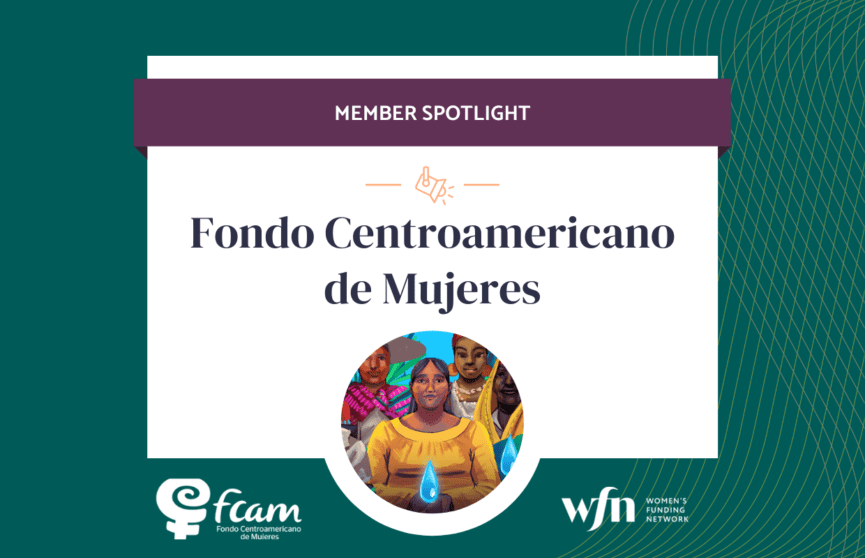Fondo Centroamericano de Mujeres (FCAM), or The Central American Fund for Women, is the first and only feminist fund in Central America. Since 2003, they have been working for a Central America where girls, women, trans and non-binary people actively participate in the construction of favorable environments for their lives and their communities.
Their initiatives and investments support the financial, political, fiscal and emotional sustainability of groups, organizations, human right defenders, networks, and movements that work for the human rights of women and marginalized genders.
Global Alliance for Green and Gender Action
FCAM helped create the Global Alliance for Green and Gender Action (GAGGA), which connects the women’s rights and environmental and climate justice movements. Through the GAGGA network, more than 400 women-led community-based organizations across 30 countries in Africa, Asia, and Latin America are supported to lead transformation action for gender, environmental, and climate justice.
One of the projects supported through GAGGA was the complaint presented in 2018 to the Interamerican Development Bank for violating, among others, its Operation Policy on Gender Equality, in relation to the large-scale hydro projects Pojom II and San Andrés in Guatemala. Asociación Interamericana para la Defensa del Ambiente has been working closely with the women in the Mayan communities directly affected by this project, and together were able to get the Interamerican Development Bank to divest from the project and design of a responsible exit plan.
After six years, FCAM continues to work together with 22 women’s and environmental justice funds and 35 national and regional NGOs, including Prospera – the International Network of Women’s Funds, WEDO, Global Green Grants Fund, and 350.org. To date, GAGGA has been able support more than 400 women-led community-based organizations across 30 countries in Africa, Asia, and Latin America.
Through their powerful network, they provide direct grants as well as non-financial support such as increased programmatic and legal capacity supporting gender, environment, and climate issues; facilitating connections and exchanges between peer organizations; and coordinating joint lobby and advocacy plans and campaigns across the globe.
Climate Change Now
The situation has never been more dire. The second instalment of the Intergovernmental Panel on Climate Change’s (IPCC) Sixth Assessment Report released in March 2022 made it clear: climate change is a threat to human well-being and planetary health, and any further delay in concerted global action will miss a brief and rapidly closing window to secure a livable and sustainable future for all.
But the report also clarified another point: bringing together scientific, Indigenous and local knowledge while prioritizing justice and equity will lead to more effective climate solutions. Such solutions already exist and are being implemented by women, girls, trans, intersex and non-binary people around the world — those who are usually first to be affected by climate change impacts and who lead local climate actions despite being overlooked in decision-making processes. Dependent on natural resources, these people are using local, traditional and Indigenous knowledge to develop climate solutions that secure and protect water resources — from coastal habitat restoration and community water management to rainwater harvesting systems and food forests.
fondo Centroamericano de Mujeres
Unfortunately, these initiatives are grossly underfunded, and the people most impacted by climate change and climate-related water scarcity are largely excluded from accessing financing that supports mitigation and adaptation actions to address climate change. Only 0.01% of funding worldwide supports projects that address both climate and women’s rights.
That’s why FCAM’s latest #WeWomenAreWater campaign is so crucial – by showcasing gender-just climate solutions, they encourage international financial institutions and climate funds to shift resources away from environmentally destructive projects that violate human rights and negatively impact water, like large dams and monoculture tree plantations, to community-led initiatives that address climate change while actively challenging gender inequalitieshttps://gaggaalliance.org/gagga-launches-2022-wewomenarewater-campaign/.
You can also find this campaign statement in Bahasa Indonesia, Filipino, French, Hindi, Mongolian, Nepali, Portuguese, and Spanish.
Check out the social media toolkit, available in Bahasa Indonesia, English, Filipino, French, Hindi, Mongolian, Nepali, Portuguese, and Spanish.
You can follow the campaign on Facebook, Instagram and Twitter using #WeWomenAreWater and #LasMujeresSomosAgua.
